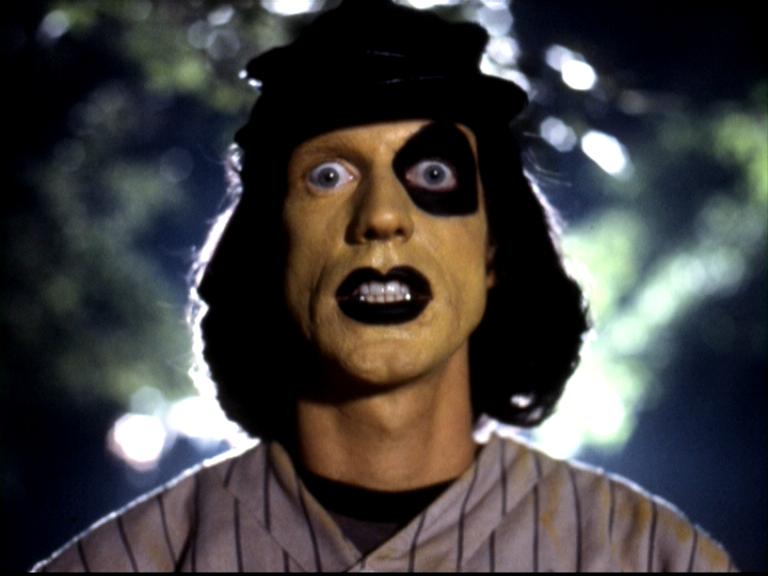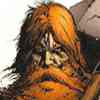I’m always looking for media featuring aliens, especially multiple races. Came across this on TvTropes. Seems to dismiss the first book and say its unneeded. Anyone here enjoy/hate this one? Any starting point you’d recommend? Most importantly how prominent are the aliens?
Startide Rising is the best of them all.
Sundiver is quite good too.
The later books were deeply marred by Brin’s giving into pressure from his editors to centre them on a group of adolescent males of diverse species because his publisher was of the view that the average scientific fiction reader was a 14 year old male. Brin has written about this and how difficult it was for him to write outside his natural quite adult style. His fantastic characters from Startide Rising are pushed into the background and only get to step forward and shine again at the very end.
I really enjoy this series. While a lot of the focus is on the humans and their uplifts, there are plenty of interesting and unique alien races. I’d read them in the order listed here: https://en.m.wikipedia.org/wiki/Uplift_Universe
Read one, wasn’t bad. My main objection is that the Uplifted species are too humanish. If I read what a character was thinking, there wasn’t a lot of difference between the chimps and the dolphins.
I’d suggest Poul Anderson for old school ‘Star Trek’ vibes. “War Of The Wingmen” and “Trader To The Stars” feature a much smarter version of Harry Mudd, a human merchant who wheels and deals with all sorts of aliens.
Adrian Tchaikovsky “Children Of Time” posits a future where a tiny handful of Earth ships have gone out to try and terraform various exoplanets. These uplifted species are way, way different from the humans and each other.
Don’t read Children of Time if you’re arachnophobic. Or do, and face your fears.
You should have marked that ‘Spoilers.’
It’s not a spoiler, it’s on the back of the book.
Look at Mr. Fancypants with his lah-di-dah book jackets!
I’ve not read the series but similar to you it’s one that’s caught my interest. However I have been told it’s better to start with Startide Rising and come back to the first book Sundivers later on as it’s a different style of book and not essential to the rest of the series.
Tldr if anyone can ?
The premise is really cool which is what interested me enough to read the first book (Startide Rising) which I enjoyed.
Future human race is entering a galactic civilization, where all the space-faring species were “uplifted” by a previous space-faring race. Uplifting essentially means educating, breeding, and enhancing species to the point of our intelligence. Humans in this universe have done this to dolphins and great apes. The other alien species in the series looks down on humans as no one knows who or even if humans were uplifted. The main characters in Startide Rising were humans, dolphins and one chimpanzee, all on a spaceship crashed on an alien world.
I would suggest at least giving the series a shot.
“Wolflings” (was it wildlings?) is the slang term for species that were abandoned by their patrons.
There’s a few things going on there. First, galactic society is very much built on the concept of order and prestige. Old races gain more power and influence by uplifting younger ones. (And the younger ones serve the uplifters in return.)
Galactic society is very heavily structured with very explicit rules of conduct (including requiring that species move on every so often from settled worlds; to allow new species to evolve)
Wolflings tend to be brash and not well mannered; as well problematic.
IIRC, there was a level of rights granted to a species that uplifted 3 other species, making humans special, because they did 2 without the resources or knowledge of patrons. A third uplifted species (the gorillas, in point of fact, or rather the ‘rillas’) would have created extensive political turmoil.
I think the rank was that indentured were newly uplifted and served their patron race for a number of generations. When a race you uplifted became a patron race by uplifting another race you’re race became a senior patron race. Senior patron races had the most power and respect.
Humanity either not having a patron or having been abandon by it’s patron would have been made a indentured race to a patron. Except we had uplifted chimps and dolphins putting us into patron status as soon as we entered galactic society.
This line jumping made us disliked by most other races. We also tended to be more like partners with or uplifted races instead of treating them like inferiors. Which made a lot of other races nervous their indentured races might start wanting the same.
Startide Rising is really good. The only Brin book I like better is The Postman.
Startide Rising, is that the one where they dive into the surface of the sun and think that they find life forms?
That’s Sundiver. Startide Rising is the sequel.
Haven’t read the book but I have a book of the cover artwork artist!
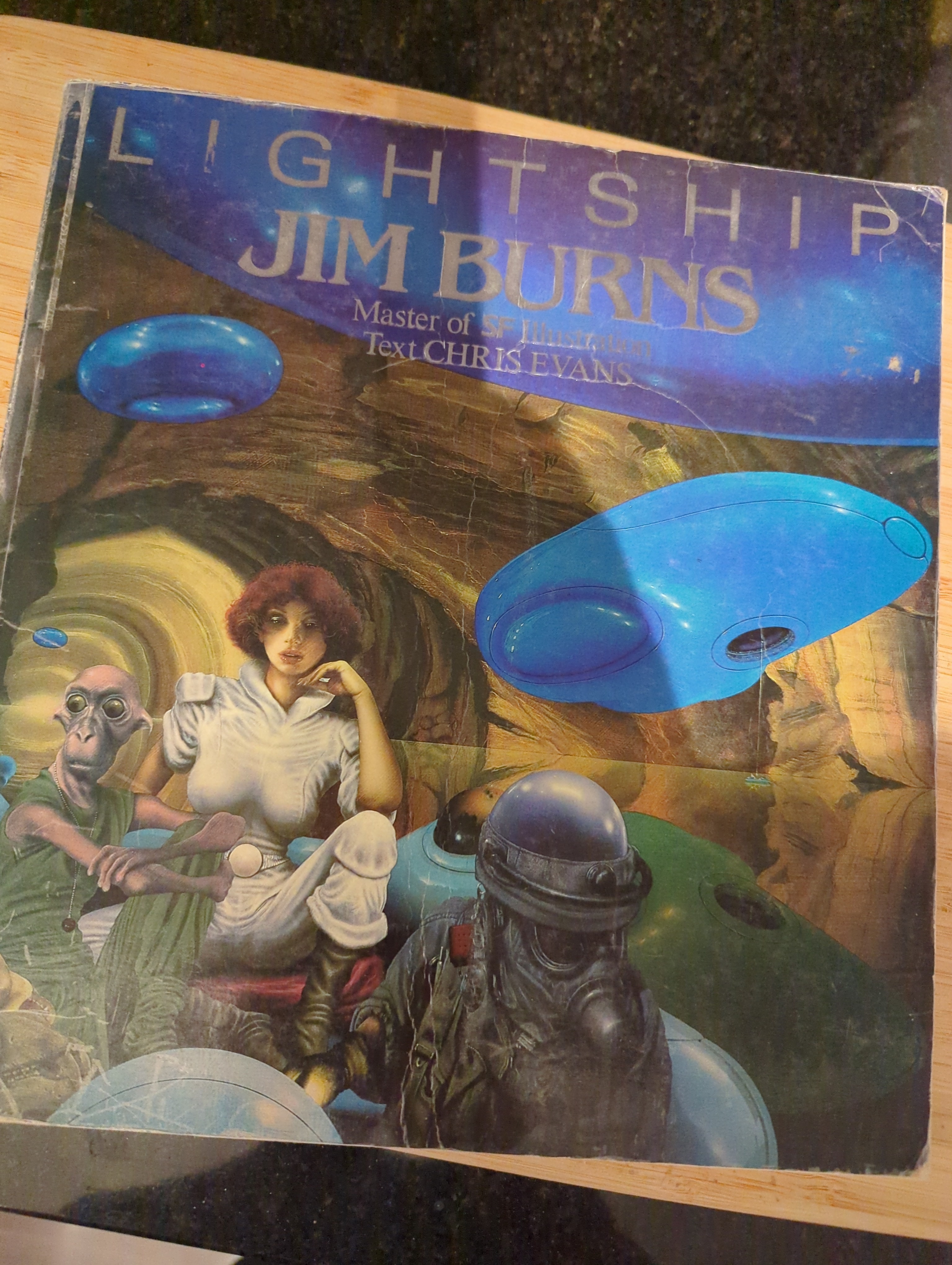
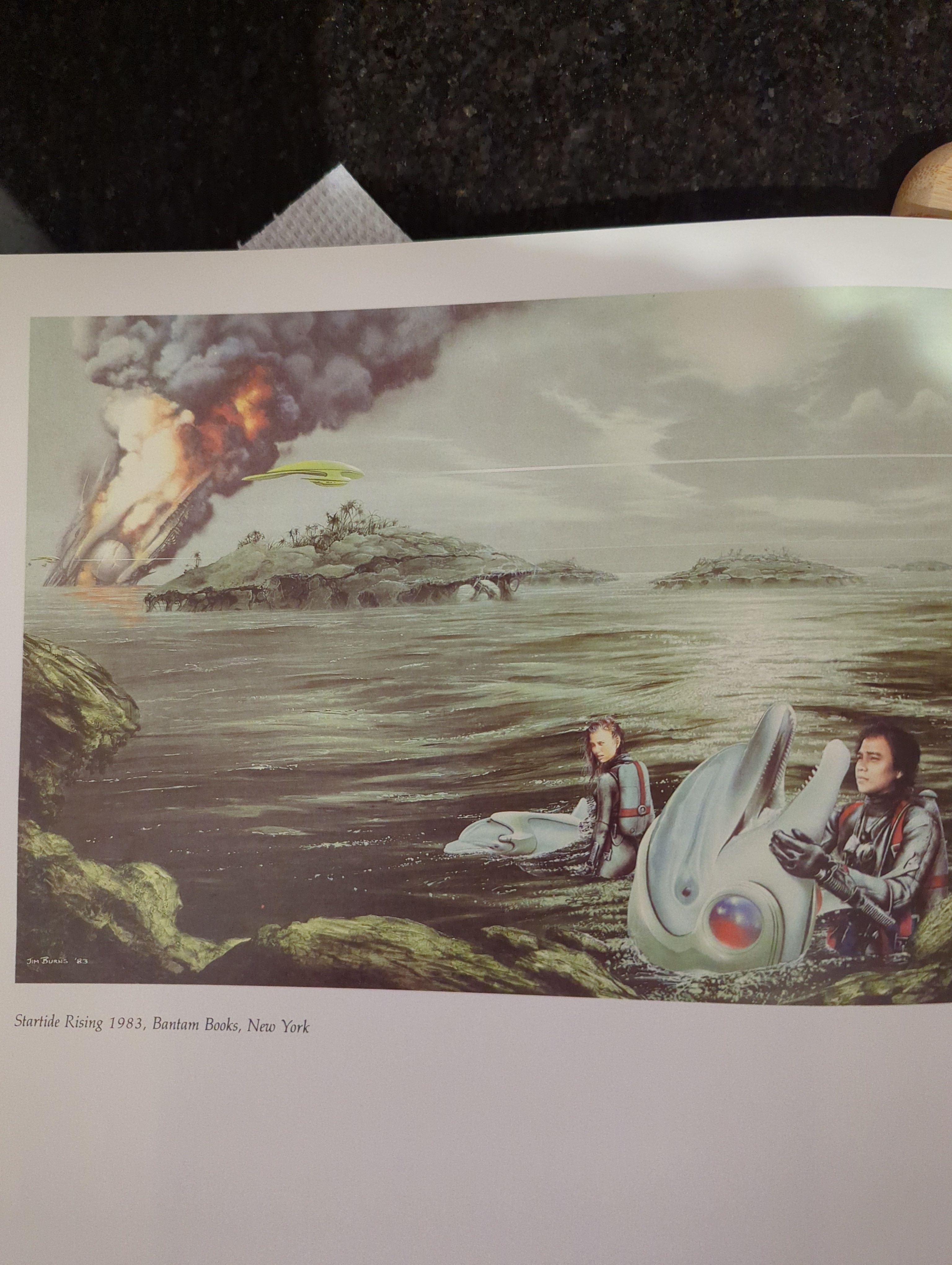
Teenage me jacked it to this book a lot. I mean c’mon.
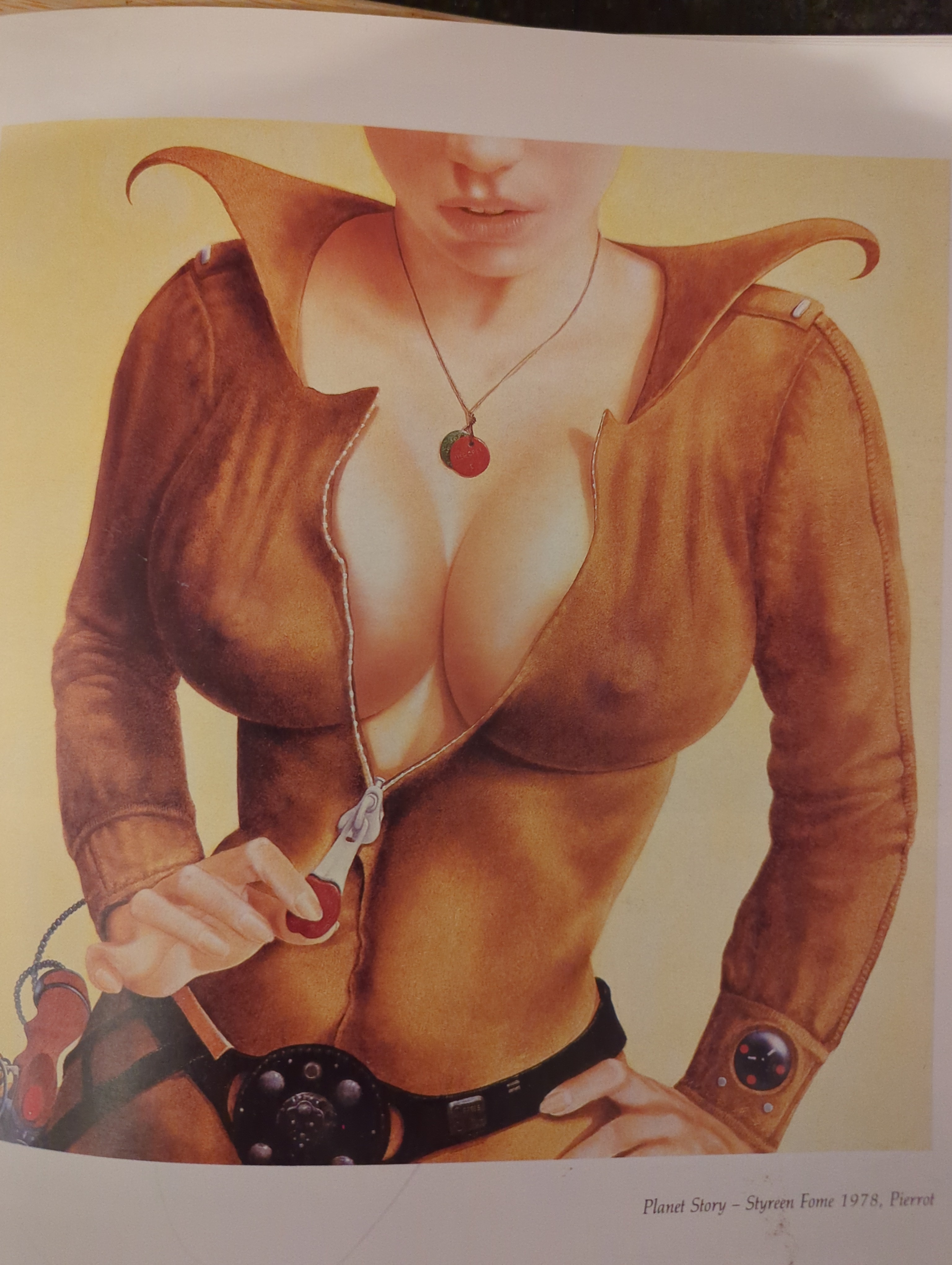
The Uplift series isn’t really that third picture but I can kind of see why this person did the cover art.
The last one actually reminds me of Saturn’s Children where the cover is like a worse CGI version of that, but the book actually thinks it through in a way that makes this person a compelling point of view character.
I have read it at least twice, because I love the idea of Apes and Dolphins in space!
Read the whole series its worth the context and wont leave you with any gaps.
Haven’t read it but if you like multiple races, etc might I suggest the final architecture series by Adrian Tchaikovsky?
Might be right up your alley
I’ll check it out! Thanks
I vaguely recall them getting consecutively better. Not that Sundiver was bad, just the later books were better. It was sometime ago, so I don’t remember a whole lot of story beats, just spaceships piloted by dolphins hiding under water, and intelligent chimps talking about their weird sex rituals. I tore through them pretty quickly and never really considered a re-read.
I read them all. I think I liked the first book fine, it’s more of a self-contained mystery, which might be better. The aliens are probably most prominent in the second trillogy; there’s loads of them and I quite like the Commons of Jijo.
I feel like the series is sort of missing pieces? Like, across the five books it is in, WTF was going on with Streaker’s discovery is never really explained, the whole the-galactics-aren’t-being-honest-with-us thread is never satisfyingly resolved in the whole series, and at several points in the chronology it feels like there could have been a whole book about the stuff that happened since the last book.
The whole series is An Aesop on how science is good. Which is fine, doing science is good and you can spend a series reminding people of that if you would like. But it’s strange to find that as the point of a series that otherwise seems to have all these frankly conservative ideas about colonizing space planets and about some people being just inherently more or less “uplifted” than others. Uplift seems to stand in for a person’s moral value without what I would consider sufficient critique. Like, paternalism is bad when the galactics do it, but when humans just have full power over a dolphin person’s entire life that’s fine somehow, you need it to do Uplift, the thing the books are about. The whole Uplift concept has unavoidable parallels to European notions of “civilizing” people by using military force to make them act more like Europeans, which I don’t think are fully examined.
I also remember them as having weird 1980s gender ideas in them, like the men are normal and the women are viewed through some weird filter and the other gender humans are entirely absent.
I think there are more interesting books to read about the structure of minds and the diversity of subjective experience. For example, Diaspora only comes out a year after Heaven’s Reach, and also has all sorts of weird aliens, but it additionally has defensible gender politics and a much more cogent thesis on autonomy and what the powers of science may or must be used to do. Or, A Half-Built Garden is all about what happens when galactic society arrives to save the humans, and the humans maybe finally don’t need saving.
They’re great! Especially Sundiver and The Uplift War.
My friend loved these books, but I haven’t read them myself
Yes, they’re good books. Ripping yarns. Their charm lies in seeing the underdog earthlings (humans and cetaceans) fight against the odds. There’s a strong vein of what you might call earthling exceptionalism running through the series.
One of my favorites!
All 3 books in the first uplift series work fine as stand-alone stories. But book 1 (Sundiver) does kinda read like a prequel to the rest of the series. The inciting incident of Startide Rising is what sets everything else in motion for all subsequent books, and Sundiver takes place before that. But it does have a bunch of world building that is helpful context for the other books (and is still a fun story).
I recommend you read Startide Rising first, then circle back to Sundiver if you are enjoying the world and the author’s style.




